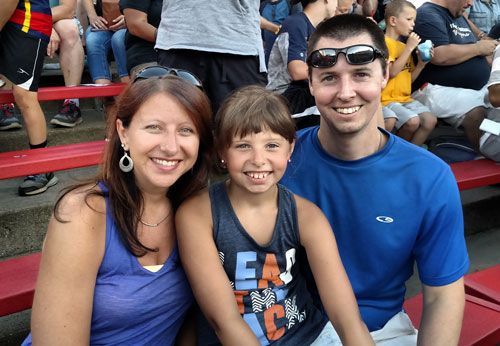On this episode of Spotlight on eWomenNetwork - Andrea Whitley recently took over a Christian-based apparel company called Blessed Attire with little knowledge of running a business. On top of that she has a genetic disorder called, "Ehlers-Danlos Syndrom," that left her at birth without connective tissue, called collagen, in her body to hold her joints together. This causes her joints to dislocate regularly, which impacts every day of her life as a business-owner and a mother. With determination, a positive attitude and a lot of help, Andrea's business is taking off while some items are selling like hotcakes. Watch the video or listen to the podcast of this inspiring young woman who has taken on this difficult challenge with a smile and a lot of grit and a dream of making the world a happier place.
Watch the video, read the shortened transcript below or click here to listen to the Spotlight on eWomenNetwork Podcast interview at eWNPodcastNetwork.com.
What is Ehlers-Danlos Syndrome?
PHYLLIS SMITH: You have this Ehlers-Danlos Syndrome. Tell us what that’s like. What exactly goes on with you in having this syndrome?
ANDREA WHITLEY: You described it perfectly. I have very little collagen in my system. Think of collagen like the glue that holds your muscles and joints together. I have very little of it. I dislocate very easily, my fingers bend backwards, my shoulders dislocate, my shoulder blades flip and my kneecaps move. I’m way too flexy is one way to describe it. When I was born, my hips were out socket. It’s called hip dysplasia. I was in almost like a body cast from under my chest to my toes. They put the cast on, then I’d have to go in, get it broken, taken off and put back on again. That went on for a couple of months because you grow like a weed when you’re a baby. That’s kind of the gist of it. A lot of it is learning how to move and shift without dislocating or bruising and things like that.
Monkey Bars are Not My Friend
PHYLLIS SMITH: As a child, what was it like for you that you can remember? You’re in elementary school, kids are going out on the playground, they’re on the monkey bars – what was that like for you?
ANDREA WHITLEY: Monkey bars are not my friend. I cannot hang from the monkey bars because my shoulders would come out, but as a kid you thought it was a cool trick. “Oh, look, my fingers can bend all the way backwards.” When running, I could never catch up with everybody else because it affects your circulation. If you can imagine you got scratched by a cat on your legs and the red streaks – that’s what my legs and my arms would look like. I said I’m going to try basketball, and that was horrible idea because I couldn’t do the free throws because repetitive things are tricky. We didn’t know, but I didn’t get diagnosed until I was 16. So there was this gap from, “Oh, it was a tough delivery, and that’s why your hips are out of socket,” and then till I was 16, it was, “Oh, Andrea is flexible,” or “Oh, well she’s not supposed to do that, but it’s okay.” I’ll be 40 in July, but then it was just something that’s wrong with me. It wasn’t really diagnosed.
PHYLLIS SMITH: A typical day for you at the grocery store: what would that be like?
ANDREA WHITLEY: I love the grocery store because I like to talk to everybody. My husband says, “You talk to everybody.” Loading the groceries is tough. Picking up a gallon of milk - if I drop a gallon of milk in my arm, it will pull my arm out of socket. I hug gallons of milk, and then I put them in the cart. I cannot carry groceries hanging down. They must go up on my shoulders. It is just learning how to adjust to things that a normal person would not think about. How you lift things, how you push things and how you walk. I can wear heels, but I can’t wear heels all day. I can go about two hours. If you ever go to the movies with me, I shift constantly. Sitting still is hard because a muscle will pull and get locked in a position. Grocery shopping is always an adventure.
A Shining Bright Light
PHYLLIS SMITH: And yet you have this beautiful smile, and you’re a shining bright light. What is it? What is it about you that gets you through this where you can look at every day and say, “Okay, I’m going to make it through. I’m going to wake up and take on the day.” What is it in you that does that for you?
ANDREA WHITLEY: A few things. I think one is I’ve never known the difference, and to me it’s my normal day. I don’t know what it’s like to not have EDS. I’ve never had pop. I don’t drink Pepsi, Coke, and stuff like that because I can’t have caffeine. Everyone’s like, “How do you survive without coffee?” Well, I don’t know what it’s like to have it. It’s not like it got taken away. With the EDS, I don’t know what it’s like to not have it. To me, my normal day is figuring out what’s going to dislocate today or figuring out what’s not going to be sore or hurt. It’s a normal day for me. It’s how our family's always been.
You know, God built me this way, and He kind of forgot some parts. The parts He forgot was the collagen. Plus, my daughter has it, and I always must remember to show her it is okay, and there’s nothing wrong with her. I get it; “Your legs feel like junk today, and they really hurt, but it’s okay. How do we move past that? How do we go from point A to point B? You’re okay, let’s keep going.”
You know, God built me this way, and He kind of forgot some parts.

My Daughter has EDS Too
PHYLLIS SMITH: You said your daughter who is 11years old has it. What was that like for you when you found out she does have EDS?
ANDREA WHITLEY: We knew there was a really big risk of it. It is hereditary. The difference is the severity level changes, and we don’t know the severity level for her yet because she’s 11. They don’t usually figure that out until a little bit later because she’s growing. I will say, I was like the crazy helicopter mother when she was a baby because she was constantly falling. We joke we should have named her Kayla Grace to give her a one-up. She had the highest accident reports in her daycare, not her room, but the whole daycare. She constantly was falling, she was constantly getting injured.
She bit her tongue three-quarters of the way across because she fell and popped her mouth. She’s clumsy because her muscles don’t contract quickly enough to stop her. It’s not so bad now, but it was scary when she was little. When we had her, we had a lot of complications when we were pregnant. It was the same thing: learning how to adjust and figure out how do we pick her up and how do we not hurt her and not hurt me at the same time.
PHYLLIS SMITH: How did you do that? You had this brand-new baby, and you must’ve had some fear about dropping her or – what did you do?
ANDREA WHITLEY: Yeah, oh my gosh. We’re going to break her. She’s more resilient than I give her credit for, but I cannot deadlift things. We figured out when she could move she’d crawl up on my lap, sit on my hip then we’d stand up together. I use the couch to kind of lift-up. It was a lot of work around. It’s just figuring out how to make things work – picking her up, picking up gallons of milk, it’s the same concept. You can’t dead lift things. What’s the work-around for it?
PHYLLIS SMITH: Which brings us to your business. Your business is called Blessed Attire. This is a Christian-based apparel company, and when you started it you were brought in to do sales by a friend. You were going to do sales, and he was going to do IT and then he left. And you came up with this bright idea to take over the business despite your condition and had to learn a whole bunch of stuff. First, why did you do that? Why did you even decide to take on a business, knowing your limitations? You just started in 2016 and you have a young daughter, too.
ANDREA WHITLEY: Yes, because I have “crazy” written across my forehead. I just felt it was the right thing to do with everything that’s been going on in this country – it was just so negative. Every news story was negative, and every story you hear coming home. This is getting insane. There must be something positive that we can get going. This seemed like the right thing to do. It seemed like the best idea: Positive messages and starting conversations in Christ. I didn’t want it to not be able to go forward. My friend who was the one to start had started getting some traction with it, but he owns an IT company and had an opportunity to expand his business, so it was the right decision for him to do. We had talked, and he said, “I really think you should go forward.” I’m like, “I really think you’re nuts.” It just felt right, and I couldn’t say no. I wanted to try the design work, and I have no background in design, in IT, in anything, but starting the conversations in Christ, getting the designs out there and getting some positive messages just felt like the right thing to do.
I have no background in design, in IT, in anything, but starting the conversations in Christ, getting the designs out there and getting some positive messages just felt like the right thing to do.
PHYLLIS SMITH: This falls in line with your liking to solve puzzles.
ANDREA WHITLEY: Yes.
PHYLLIS SMITH: It makes sense as we’re talking through it – yay, I can learn!
ANDREA WHITLEY: Let’s go figure them out. Yeah, I had to learn how to build a website, which I had no experience in. I had to learn graphic design, Photoshop, how to setup a Shopify store, and how to do taxes. I had to learn how to find the right shirts, suppliers, vendors and printers. I had to find out if I can get into stores, which is one of the goals for 2018 - to get into 10 stores across the country. I had to learn how to do vendor shows, what a booth looks like and how to build clothing racks. Yeah, it was a lot of learning.
PHYLLIS SMITH: And it still is, but you also say one of the most important things for you is you make sure you had support.
ANDREA WHITLEY: Yes, a lot of support. It took a little bit to realize, but you must get to a point where – my husband is wonderful and very supportive. My parents are supportive, and I have a wonderful sister who helps. They’re my backbone. I had to learn that math is not my strong suit, so I had to get somebody in here to help with the accounting aspect. I need somebody to teach me how to do design work. I don’t know SEO and coding, and someone must show me how to do this. When you start a company, you must realize that you cannot do everything on your own, even if you are a crazy control freak like I am. You have to get those people in your wheelhouse that you can go to that are going to be honest with you and say, “This is great. This is stupid. This is not going to work. I’ve tried this and it’s not a good idea.” There were designs I thought would do great that nobody liked but me. The shirt I have on, Just Breathe – I didn’t know this was going to work, but this is one of our best sellers. It’s learning what works and getting those people behind you that are going to be supportive but honest.
If It's Not Working, Try Something Else
PHYLLIS SMITH: Tell us the lessons you’ve learned from having EDS and how you apply that in your business.
ANDREA WHITLEY: I think one of the biggest ones is to try, and if you try and you fail, it’s okay. With the EDS, like I said earlier about sports: I tried them, failed miserably and moved on, but at least I tried. It’s the same thing with business. You’re going to make mistakes, but at least make the effort to try, and if you make the mistake and you fail, learn from it. Like I said, some of the designs I tried that I thought were going to be great, they were awful. Nobody liked them but me. It’s trying – I tried this business, and it’s wonderful. It’s going great, and it’s a lot of fun.
I wanted to give back to the community, and I tried a program that just wasn’t working, so we have a different one out there. Try, make an effort and try. It is okay to fail. It is okay to make a mistake. Don’t give up and go, “Well, I tried. I failed, and I’m not going to do it again.” Nope, get back up and try it again. If you’re going to fail, try it again. Figure out what you did wrong and say, “Okay, well, if I had done it this way, what could have happened?" Try it that way and then keep trying.
You’re going to make mistakes, but at least make the effort to try, and if you make the mistake and you fail, learn from it.
Words to Live By
PHYLLIS SMITH: Okay, tell us about that shirt.
ANDREA WHITLEY: It says Just Breathe, and the "T" is a cross. I tend to go like this; I get very frustrated and then I’m like – [loud breath] – just breathe. My husband tells me, “Andrea, just breathe.” That’s where the shirt came from. A couple months after we designed it, there was a Christian song that came out and part of the lyrics are “just breathe." We did a huge vendor show in November, and I could not keep this design at the show at all as it completely sold out there, and it’s one of the most popular ones we have online is the Just Breathe.
PHYLLIS SMITH: What are the some of the other sayings that you have on your clothing? Your goal is to start a conversation, which you said earlier. It’s not just to make a statement. It’s to get people thinking.
ANDREA WHITLEY: One that I like is Be Still and Know. Another one I like is Work Hard, Have Fun, and Trust God. I think you must work hard in life, you must have fun in your work, but you must trust God all at the same time. Some of the men’s ones say Iron Sharpens Iron. I think that’s one of the greatest phrases. To me, it means if you’re around sharp people and you are around those that strengthen you, you’re going to strengthen them back. It’s working together.
Andrea Whitley is the Owner, CEO and Designer of Blessed Attire. She is a member of the Cincinnati, Ohio Chapter of eWomenNetwork.
Watch the video above or click to listen to the entire interview with Andrea Whitley at eWNPodcastNetwork.com.
Transcription services provided by our eWomenNetwork member, Rhonda’s Virtual Office.
Want to improve your processes, save time, and make more money?
Contact Rhonda’s Virtual Office. They do it all!











